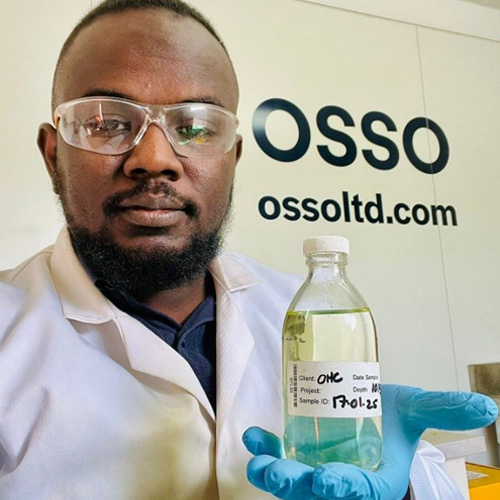
Chemical & process engineeringMohaned Aboshatta
What made you choose to study at Strathclyde?
I chose to study at Strathclyde because of its outstanding reputation in chemical and process engineering, with a strong emphasis on industrial links, practical applications, and cutting-edge research. The department’s focus on innovation and sustainable engineering really aligned with my personal and professional goals. I was also drawn to Strathclyde’s diverse and welcoming environment, which offered the chance to learn from a truly international community.
What did you like about living in Glasgow/Scotland
I really enjoyed living in Glasgow due to its vibrant culture, friendly people, and the rich history that is woven into the city’s character. The mix of modern life with traditional Scottish heritage made every day an interesting experience. Scotland’s natural beauty, from the Highlands to the lochs, was also a huge highlight — it was wonderful having such incredible landscapes to explore during #ReallySmallScience outreach activities, weekends and holidays. Aye!

Do you think studying at Strathclyde helped give you the correct knowledge and practical skills for your future career?
Absolutely — studying at Strathclyde provided me with a solid foundation in both theoretical knowledge and practical skills that have been directly relevant to my career. During my PhD, I focused on developing green chemicals and carbon capture processes, which required a strong grounding in sustainable engineering, process design, and analytical thinking. These skills have seamlessly transferred to my current role as a Principal Environmental Scientist, where I develop green chemical solutions for wastewater treatment. The critical thinking, problem-solving, and project management experience I gained at Strathclyde has been invaluable in adapting to industrial challenges and delivering environmentally responsible innovations.
Give some details of your career path, from graduation up to your current job
After earning my MSc in Chemical Engineering from the University of Gezira in Sudan in 2013, I began my career as a R &D QHSE Engineer, focusing on industrial process safety and optimisation. I then worked as a Research Assistant at the United Arab Emirates University, where I deepened my interest in sustainable technologies. This led me to pursue a PhD at the University of Strathclyde, where I focused on green chemicals and carbon capture. In 2023, I joined OSSO Ltd Providing Clear, Sustainable Solutions - OSSO Ltd as a Principal Environmental Scientist, where I now develop innovative, sustainable wastewater treatment solutions. Throughout my journey, I’ve always been driven by a desire to connect academic research with industrial impact.
Give details of any successes or awards won throughout your career
One of the most rewarding achievements in my career so far has been leading the development of the OSSO Hybrid C, a high-performance natural coagulant and flocculant for wastewater treatments, derived from chitin — the second most abundant biopolymer on Earth. This innovative product offers a sustainable alternative to conventional metal-based coagulants, with several key advantages: it is a 100% natural, dual-functioning coagulant and flocculant, less toxic than the metal-based coagulants, does not require pH adjustment, is less corrosive than metal-based coagulants, and demonstrates superior contaminant removal efficiency. It’s a clear example of my commitment to bridging green chemistry with real-world environmental solutions.
When did you start working in your current position? and give some details about your current role and responsibilities.
I started my current role as a Principal Environmental Scientist at OSSO Ltd in September 2023. In this position, I have been involved in designing, reviewing, and optimising wastewater treatment plants, ensuring they meet wastewater characteristics and discharge criteria set by regulatory bodies in the UK, such as the Environment Agency (EA) in England, SEPA in Scotland, and NRW in Wales. I evaluate the performance of proposed treatment systems to ensure compliance with consent standards.
My role also involves managing R&D projects on developing treatment solutions, advancing wastewater treatment technologies, and creating sustainability reporting frameworks. Additionally, I manage a fully equipped environmental laboratory, overseeing comprehensive chemical and physical testing to validate treatment performance and inform process improvements. I also support the technical sales team by reviewing client chemical data and site investigations, helping deliver tailored, effective solutions.
What do you enjoy most about your job?
What I enjoy most about my job is its strong research-driven nature. As a principal scientist, I have the opportunity to continuously investigate new solutions and develop innovative, sustainable technologies for wastewater treatment.
I really value being able to apply scientific principles and analytical skills to solve real-world environmental challenges and seeing that research directly translated into practical improvements for clients, the wider community and the environment makes the work intellectually stimulating and deeply rewarding.
What advice would you give to those who are considering studying in the Department of Chemical & Process Engineering at Strathclyde?
My advice would be to fully embrace the wide-ranging opportunities the Department of Chemical & Process Engineering at Strathclyde offers. Take advantage of its excellent research facilities, strong industrial connections, and international outlook. Engage deeply with both the academic and practical elements of your studies, because the skills you build there — from critical thinking to hands-on problem solving — will serve you well in any career path.